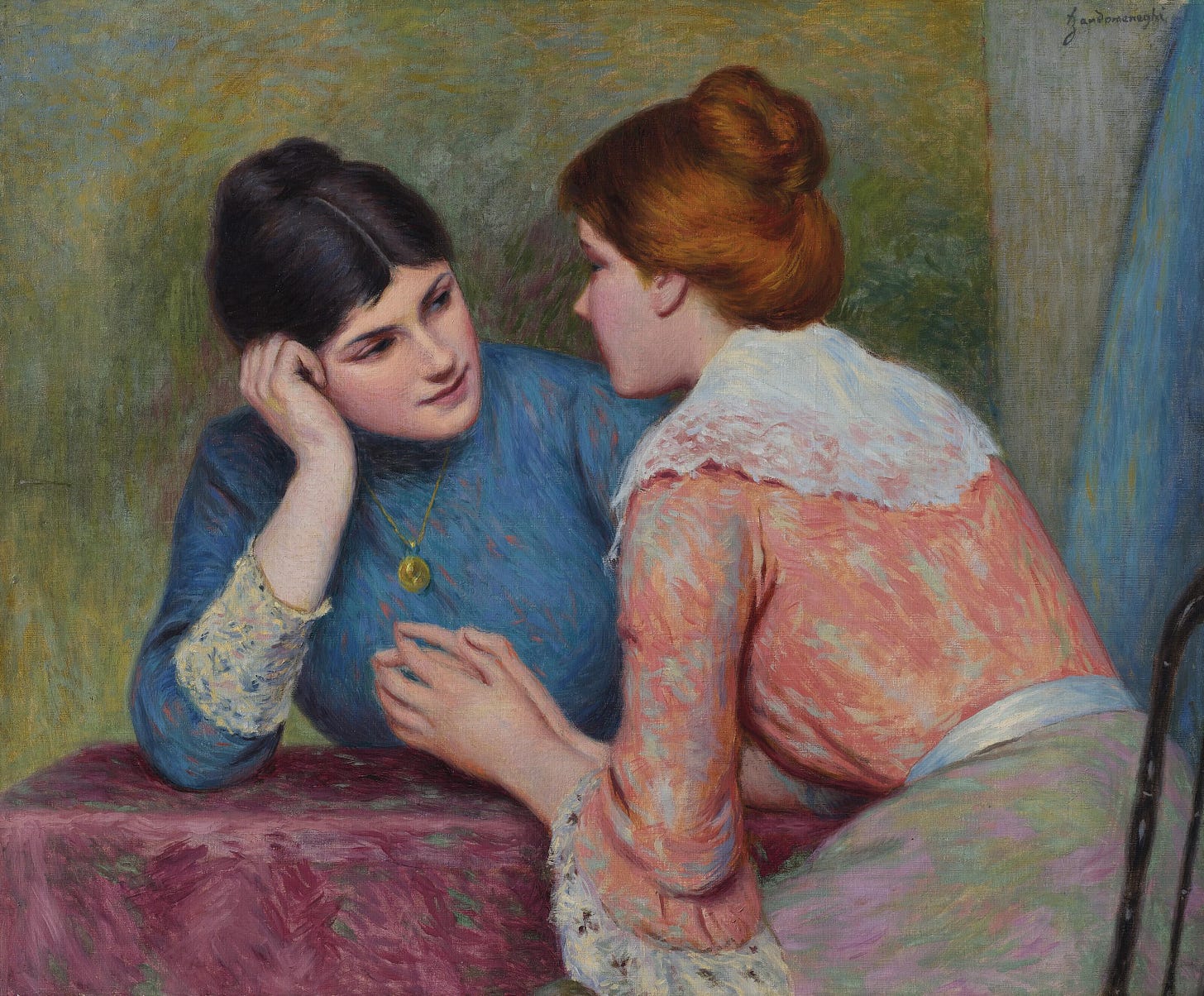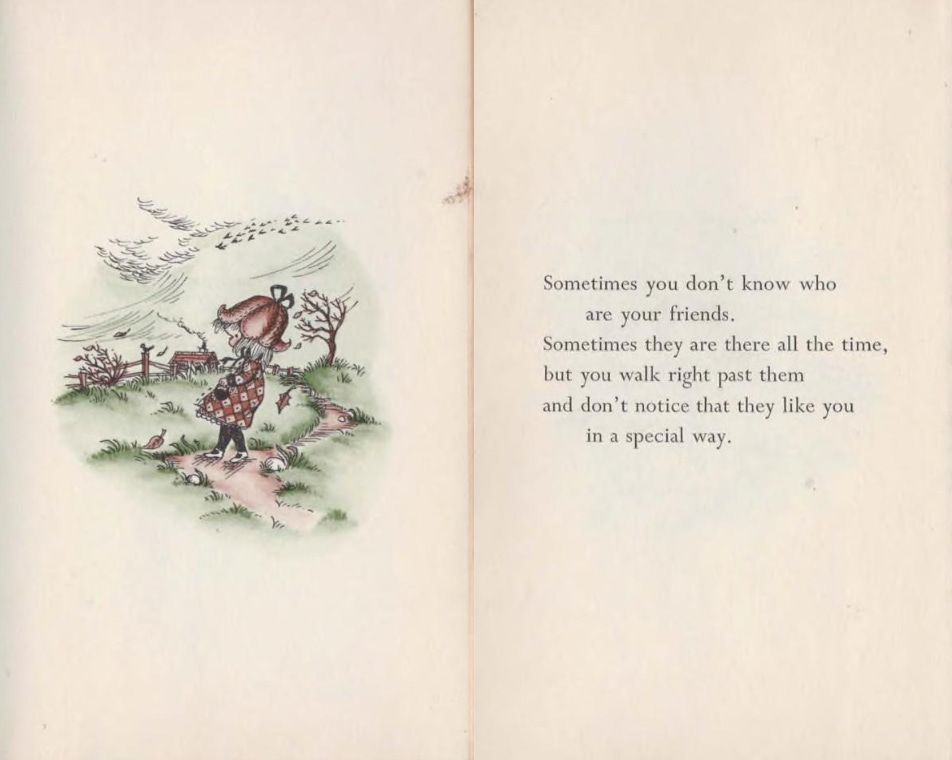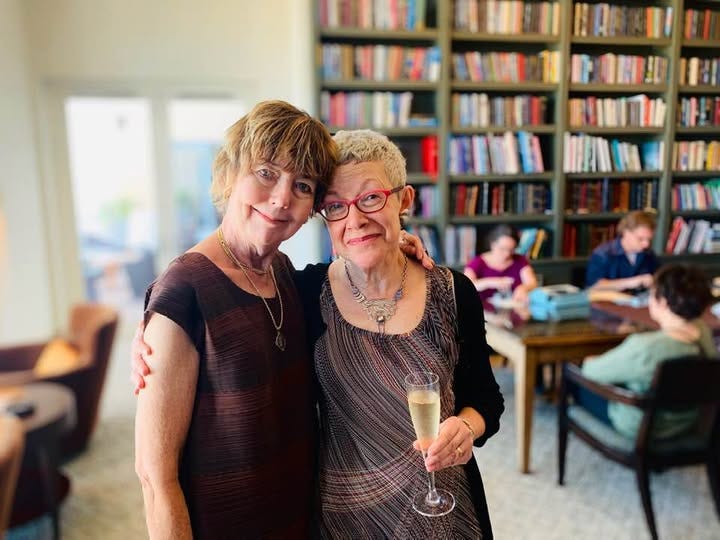How to Be a Friend
Nobody has to be lonely. Trust an old dame who wised up--and has entered the golden age of friendship.

They came for me at my usual spot on the edge of the playground. I’d been dreaming up a story when they closed in, big girls with malign intent gleaming in their eyes. They pinned me with hard, cold stares until the ringleader asked, her tone a dagger, “Why don’t you have any friends?”
I had a magic trick for escaping anything that hurt. It worked when my father drank and when the kids in gym class yelled, “Easy out!” All I had to do was ride the current of my thoughts to safety. This time the magic failed. The bullies had sliced me open like a rabbit. My loneliness throbbed and bled as the first tear of shame slid down my cheek.
Every lonely person has a reason to explain her state. I had a fistful of reasons, from failure at every sport to goofy glasses and hand-me-down socks that sagged at the ankles. Other girls were nimbler, prettier, naturals at the art of girlhood. I didn’t deserve their friendship—although, as my mother told it, they were the undeserving ones. Fifth grade was no place for a child of my gifts and discernment. In the faraway land of college, I would find my tribe.
How could I hold on till then? I had sometime playmates, all of them weirdos like me. I craved a friend of the heart. Each September I hoped she’d enroll at my school and choose me at a glance. Everyone would want such a kind and beautiful friend. Everyone but me was out of luck.
My problem was both dead simple and the work of a lifetime. I didn’t know how to be a friend.
Around the time I claimed the edge of the playground as my spot, a young writer and artist moved from the Midwest to New York City. Joan had a family but no friends, and loneliness tore at her. Looking up at the buildings that towered over her, she pictured people living in “separate boxes of distrust.” Then an insight struck her. Behind each window was a potential friend.
Joan took a few notes and stashed them in a drawer, where her husband discovered them. He saw the makings of an illustrated book for children—and he was right on the money. A Friend Is Someone Who Likes You, published in 1958, became a runaway hit that launched the stellar career of Joan Walsh Anglund. Before her death at 95, she published more than 120 books that collectively sold 50 million copies and counting.
Like all enduring books for children, Friend articulates a truth that applies to all ages. Friends are waiting to be found. If you feel alone, try paying attention. As Anglund tells her readers,
Sometimes you don’t know who are your friends.
Sometimes they are there all the time,
but you walk right past them
and don’t notice that they like you
in a special way.

A few years ago I met up with a longtime schoolmate who lived not far from a house we were renting for the winter. I expected a breezy conversation about roads traveled since we marched through the gym in mortarboards. Wendy, as I’ll call her, had excelled in a business inhospitable to women. At 70, she still burned with ambition. No surprise to anyone who’d seen her drive the ball in field hockey.
The revelation was her memory of me, how I held her captive while reading a poem to the class. Dylan Thomas, I think. She didn’t know or need to know what the poet meant to do with the words that spilled from me, only that they enchanted her. I’d been yearning for a friend to share my love of poetry and never pictured Wendy as the one. What did we have in common? Wendy, a stalwart in the band, played marches on her French horn; I strummed doleful ballads about vengeance and betrayal. Wendy flourished in Biology and Algebra; I couldn’t see the point of either. But over lunch at a hotel in Florida, she told me how she’d longed to be my friend. “Every time I walked past your house,” she said, “I’d look up at the windows and wonder which was yours.”
Joan Walsh Anglund called it. Wendy liked me in a special way. She could have spared me years of loneliness at school. She could have shared my world and made me welcome in hers. With Wendy as my friend, I might have seen beauty in the loathed frog on my dissecting table, its vertebrae and vital organs a tiny version of my own. I might have seen myself as an animal among animals, not as a lone exile in a constellation of tribes.
But I walked right past her.
My friends remind me of a garden. The flowers don’t thrive on their own. I have to weed, nourish, prune and deadhead. In close to 60 years since my graduation night, I’ve made friends in student hangouts, offices, locker rooms and blog posts. I used to think all I had to do was go where people went who shared my interests.
I was editing a magazine piece when a workmate interrupted me to ask, “Did you know Joanna Morgan?” The past tense.
Joanna was young—my age, early 40s. We’d been sister editors at sister magazines, both women’s titles with skimpy budgets. While I dithered about moving on, Joanna broke into newspapering and became my first single friend to buy a house. We hadn’t spoken since I called one afternoon to say hello, as friends did before email and texting. My timing could not have been worse: She’d just fallen asleep after a long night at the paper. Embarrassment froze me. For fear of disturbing her again, I stopped calling.
I’d like to give my young self a talking-to. Send a note, for God’s sake. Tell her you miss her. It was a minor social mishap, nothing more. At 30-something, it’s easy to think you have years to rekindle a friendship. Joanna had survived breast cancer. In our silent years, it came back and took her down. I remember how she pushed me to give my career the same care I lavished on magazine copy. I should brush up my resume, go for that newspaper job. “What’ll it cost you, Rona? A stamp!”
Joanna Morgan: her real, precious name. I haven’t heard it spoken since her funeral more than 30 years ago, when the death of a friend seemed improbably freakish.
I’ve made a new addition to the poems I carry in my heart—“The Layers,” in which Stanley Kunitz singles out losing friends as the defining challenge of old age:
How shall the heart be reconciled
to its feast of losses?
In a rising wind
the manic dust of my friends,
those who fell along the way,
bitterly stings my face.
Every time an old friend leaves this world, I miss the piece of myself that followed. I’ll never make another friend who toasted my wedding or consoled me when my mother died. “You can still talk to her,” said Joanna, also a motherless daughter. “You just can’t expect much of an answer.” It strikes me, over lunch with one of my forever people, that one of us will write a condolence for the other.
Yet loneliness—for many the scourge of growing old—has not come for me. “Nobody wants an old woman,” laments a widow of my acquaintance. It’s more accurate to say that nobody is drawn to a person of any age who doesn’t know how to be a friend. I’m lucky: My husband and best friend is as healthy as pretty well anyone can be at our stage. I’m also mindful about filling empty spaces in my garden. When I’m smitten with the art gallery’s latest show, I ask myself who else will love it—and book a date to take her as my guest. I’m not shy about saying, “I’m glad we’re friends.” I no longer expect each new friend to tick all the boxes. So what if the Blake on her nightstand is Olivie, not William? She might be first to step in when I could use cheering up.
The most joyful surprise of later life has been the newfound ease of making friends. Ruth and I were somewhere around 60 when each of us took to the other’s blog. Her home in Austin is a four-hour flight from mine in Toronto, but we’re a motivated pair. Since our first coffee date in New York, we’ve met a few times in her city and mine. Austin seemed a long way to go for a birthday party, but Ruth was turning 70—a month after me, almost to the day. We writing sisters were also birthday sisters, and I couldn’t be more grateful for our friendship. Three months before Covid stopped the world, I celebrated Ruth-day in Austin. The memory warmed me all through lockdown.

I’m still learning how to be a friend. One step back, two steps forward. I flew to Austin seven months after my lunch in Florida with Wendy. She and I exchanged heartfelt emails about what she called “our newfound friendship.” I spoke warmly of seeing her again. She was moving to a a city closer to Toronto. How complicated could it be? Three days ago, with the art of friendship on my mind, I sent her a note she has not yet answered. LinkedIn tells me she’s working, so maybe she’s just busy. Then again, maybe my tone was off. The mystery and the marvel of friendship is how abundantly it blooms, when inattention and inertia could have struck like a killing frost.
What’s your best tip for sparking and nurturing friendship? Does finding friends get easier or harder for you over time? I’d love to know and take replying seriously. If you don’t hear back, it’s because the comment thread sprouted shoots I didn’t see in the flurry of conversation. What I prize most about your comments isn’t praise for my writing, much as I enjoy it, but the insights and stories you share. You’re more than subscribers or followers to me. You are seasoned humans who inspire me to keep writing. Many of you have been so generous with your thoughts that I think of you as friends.
If this post moved you, check out “The Friends of Your Life Are a Garden,” a tribute to some friends loved and lost. Or head over here to meet the big-hearted artist who stayed loyal to my envious and often abusive father. Friendship fascinates me, and I’ll return to it in future posts.
Every time you click the heart, leave a comment or share a post, you’re making it simpler for new readers to discover Amazement Seeker. Every paid subscription is an orchid at my door, a gift that brings the giver nothing but my gratitude and amazement. More amazement, to be precise. Writing for readers who value my words is pretty amazing in itself.
This time next Sunday, I’ll be thinking of a dry-brined turkey and the timing of my gravy operations. But you’ll still find me here with a story. I wouldn’t miss you for anything.






Hi friend! I understood exactly what you spoke of with regard to childhood friendship. I was lonely and frustrated as a child. It was so hard for me to find my person/people. My best friend arrived when I was 12, and then she left at 13, and returned to me at 14. The one year gap was terrifically painful, as I didn't understand why she deserted. I found out upon her return, and gave her a pass, because I missed her so. Friendship as an adult has been easier, there are a lot of people in my world whom I love and am loved by. Maintaining friendship for me, requires a willingness to stay connected...but also a commitment to making that connection by reaching out, not becoming resentful if I'm always the one making the connection, (why don't they call me?) and owning it when I drop out of sight (which I often do). We are busy in our insular lives. I have more understanding of that, and don't feel hurt as easily as I used to. And then, there are those special friends. The ones I might not talk with for years, but the minute we reconnect, it's like no time has passed at all. And my friends? They're gold. Love you, Rona.
Sometimes I think I am the luckiest person in the world. In high school, I was part of a tight circle of friends (girls and guys) that never disbanded. We were neither prom king or queen material nor nerds. We managed to be semi-invisible by falling somewhere in-between. We called ourselves 'the gang'.
We all married and brought our partners into the fold. We had kids and lost parents but never lost touch with each other. It has been more than five decades since we first got together, but we still see each other regularly.
Two weeks ago, the 12 of us gathered for a pot luck lunch. Yes, we're older (and hopefully wiser). The men have lost their hair, the women's hair is gray and we're all a little heavier. But whatever it was that drew us together in the first place is still strong and vibrant.